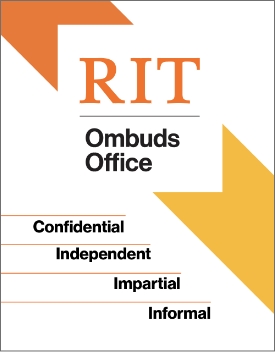Ombuds Office

Ombuds Office
How can the Ombuds Office help you?
Visit the Ombuds Office when…
- You are experiencing a conflict, dispute, or concern at RIT and want a confidential discussion about these issues
- You want to discuss and thoroughly examine your concerns, identify and evaluate options for managing or resolving issues
- You are seeking information, policies, procedures, or resources that could help you consider your concern from different angles
- You want an informal, confidential, facilitated discussion/mediation with another member of the RIT community, with the goal of seeking resolution, reconciliation, or managing a dispute
- You want conflict coaching for ways to negotiate disputes, disagreements, or concerns
- You need information or referrals to formal and informal resources to help you manage concerns
We Can
- Listen carefully and confidentially to an individual’s or group’s concerns and issues
- Help you examine all issues impartially
- Help explore and analyze options, strategies, and steps for resolution
- Offer appropriate dispute resolution processes, such as information gathering, informal inquiries, informal mediation, and negotiation
- Identify and explore possible relevant policies, procedures, and resources
- Coach individuals through the conflict management and resolution processes
We Can Not
- Serve as an office of notice to the university
- Have administrative decision making authority
- Advocate for individuals in a dispute (but will advocate for a fair process)
- Participate in formal grievances or other formal processes on campus or in legal cases
- Provide legal or psychological counseling.
Due to the informal nature of the Ombuds Office, sharing a concern does not constitute formally notifying the university about an issue. However, we can assist and refer individuals to formal RIT resources.
Standards of Practice
The Ombuds Office abides by the International Ombuds Association’s Standards of Practice and Code of Ethics.
We hold all communication in strict confidence. Exceptions to confidentiality are only when the Ombuds determines an imminent risk of serious harm.
We do not take sides in any issue and will explore the interests and positions of all involved with the goal of achieving a fair and equitable resolution to the issues.
Use of the Ombuds Office is voluntary for all RIT community members. We do not participate in formal investigations or grievance processes.
The Ombuds Office functions independently with respect to case handling and issue management.
Frequently Asked Questions
Below are some frequently asked questions of the Ombuds Office. We encourage all interested individuals to contact us with any questions or concerns about the office.
University students, administrators, faculty, and staff can contact the Ombuds regarding their campus related concerns. We encourage visitors to schedule an appointment, however may drop-in during normally scheduled office hours. Contact Joe Johnston, Ombuds, at 475-7357 or Ashley Meyer, Associate Ombuds, at 475.6424 by phone or email us at ombudsask@rit.edu. You may also contact Tammy Brongo, our Office Coordinator, at 475-7200 for scheduling with either Ombuds. We want individuals to feel comfortable when they visit the office. Depending on circumstances and willingness or all parties, visitors can bring guests. This option can also be discussed at the time of the visitor's initial contact with the office.
Conversations with our office are considered confidential, and we will not disclose any part of your conversation without your permission. However, confidentiality cannot be promised if there is imminent risk of serious harm. We do not maintain identifying records. We are not an office of record. Speaking to anyone in the Ombuds Office does not constitute legal notice to the University that a problem, concern, or complaint exists. You must pursue alternative complaint avenues if you wish to obligate the University to respond in any way.
The Ombuds Office is always an informal option. Other conflict resolution offices may require a formal process. Our services are visitor initiated. All processes and strategies are used at the discretion of the visitor. The Ombuds Office is independent of all other University offices and decision-making practices. Our Office does not make administrative decisions and does not have authority to change disciplinary action. If you aren’t sure where to take your concern, the Ombuds is a safe place to start.
The University Ombuds Office is independent of ordinary line and staff structures and exercises autonomy regarding its responsibilities.
We will listen to your concerns and make you aware of all of your options and resources. If your concern requires a formal process or specialist to assist you, we will help refer you to another office.
You are not precluded from pursuing formal remedies if informal approaches through the Ombuds Office do not work. We can refer you to your formal options if necessary.
Sometimes the most effective way to resolve a conflict is to bring two parties together, with a third party to facilitate an effective and productive dialogue. Mediation is a process using a neutral party who is trained to facilitate the resolution of a conflict. Mediators assist in the clarification of issues and the generation of options for resolution. Mediators help parties reach their own agreement and do not make a decision regarding the outcome of a dispute. In order for mediation to be effective, parties must be willing to be active participants in the process. Mediation through the Ombuds Office is informal. Informal mediation is voluntary and related agreements are non-binding.
Contact Us
Email us at ombuds@rit.edu, a detailed email is generally not recommended for reasons of confidentiality.
Office Hours
Monday - Friday, 9:00am - 4:30pm
(Times outside general business hours can be arranged as needed)
We’re located in SAU Room 1110
(inside RITreat)













